Intro
Discover the ultimate Fecal Occult Blood Test Guide, covering colon cancer screening, gastrointestinal bleeding detection, and stool test procedures, to help diagnose hidden blood in stool and prevent digestive disorders.
The fecal occult blood test, also known as the FOBT, is a crucial screening tool used to detect hidden blood in the stool, which can be an early sign of colon cancer or other gastrointestinal issues. This test is widely recommended for individuals over the age of 50, as the risk of colon cancer increases with age. However, it's essential for people of all ages to understand the importance of this test and how it can help save lives. In this article, we'll delve into the world of fecal occult blood tests, exploring their benefits, working mechanisms, and steps to take if you're due for a screening.
The significance of the fecal occult blood test cannot be overstated. According to the American Cancer Society, colon cancer is the third most common type of cancer in the United States, with over 100,000 new cases diagnosed each year. Early detection is key to treating colon cancer effectively, and the FOBT is a vital tool in this process. By detecting hidden blood in the stool, the test can identify potential issues before symptoms arise, allowing for prompt medical attention and treatment.
The process of taking a fecal occult blood test is relatively straightforward. The test typically involves collecting a small sample of stool, which is then sent to a laboratory for analysis. The lab will check the sample for the presence of blood, which can indicate a range of issues, from colon cancer to ulcers or hemorrhoids. If the test results come back positive, your doctor may recommend further testing, such as a colonoscopy, to determine the cause of the bleeding.
Fecal Occult Blood Test Benefits
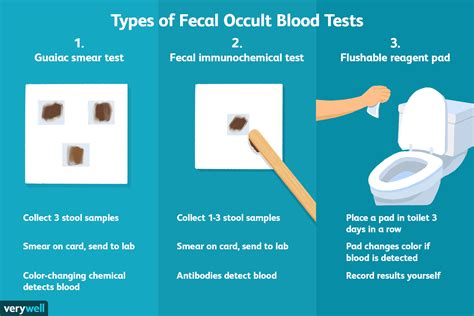
Some of the key benefits of the fecal occult blood test include:
- Early detection of colon cancer and other gastrointestinal issues
- Non-invasive and relatively painless procedure
- Highly effective in detecting hidden blood in the stool
- Cost-effective option
- Can help identify potential issues before symptoms arise
How the Fecal Occult Blood Test Works
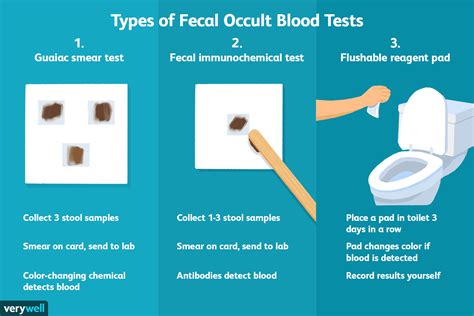
The steps involved in taking a fecal occult blood test include:
- Collecting a small sample of stool using a special kit
- Sending the sample to a laboratory for analysis
- The lab checks the sample for the presence of blood
- If the test results come back positive, further testing may be recommended
Types of Fecal Occult Blood Tests
There are several types of fecal occult blood tests available, including: * Guaiac-based tests: These tests use a chemical called guaiac to detect the presence of blood in the stool. * Immunochemical tests: These tests use antibodies to detect the presence of blood in the stool. * DNA-based tests: These tests use DNA analysis to detect the presence of blood in the stool.Fecal Occult Blood Test Results
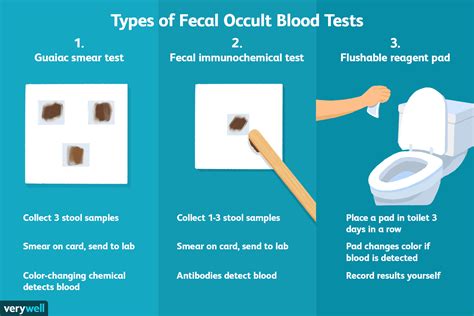
Some things to keep in mind when interpreting the results of a fecal occult blood test include:
- A positive result does not necessarily mean that you have colon cancer
- A negative result does not necessarily mean that you do not have colon cancer
- The test is not 100% accurate and may produce false positive or false negative results
Preparing for a Fecal Occult Blood Test
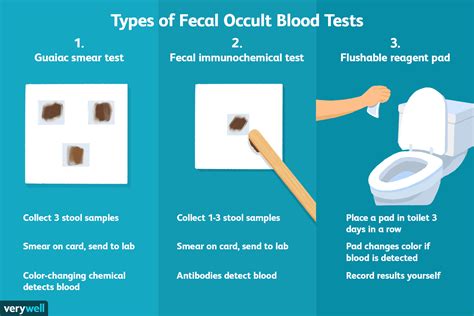
Some tips for preparing for a fecal occult blood test include:
- Follow a special diet for several days before the test
- Avoid taking any medications that may affect the test results
- Collect the stool sample according to the instructions provided
- Send the sample to the laboratory for analysis as soon as possible
Fecal Occult Blood Test Risks and Side Effects
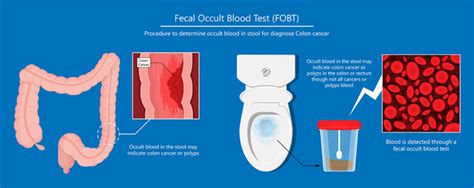
Some potential risks and side effects to be aware of include:
- False positive or false negative results
- Unnecessary further testing or delayed diagnosis
- Emotional distress or anxiety related to the test results
Fecal Occult Blood Test Cost and Insurance
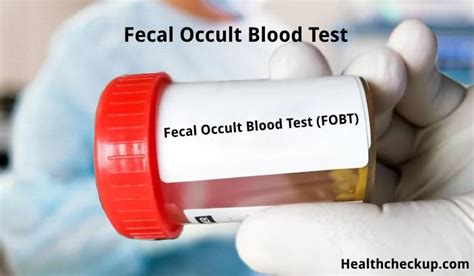
Some things to keep in mind when it comes to the cost and insurance coverage of a fecal occult blood test include:
- The cost of the test can vary depending on the location and laboratory
- The test is generally considered to be a cost-effective option
- Many insurance plans cover the cost of the test, especially for individuals over the age of 50
Conclusion and Next Steps
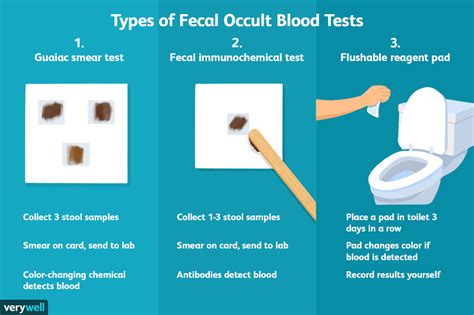
Some next steps to consider include:
- Scheduling a fecal occult blood test with your doctor
- Following the instructions provided to prepare for the test
- Discussing the results with your doctor and determining the next course of action
We encourage you to share your thoughts and experiences with the fecal occult blood test in the comments below. Have you taken the test before? What was your experience like? Do you have any questions or concerns about the test? Let us know, and we'll do our best to address them.
What is the purpose of a fecal occult blood test?
+The purpose of a fecal occult blood test is to detect hidden blood in the stool, which can be an early sign of colon cancer or other gastrointestinal issues.
How often should I take a fecal occult blood test?
+The frequency of taking a fecal occult blood test depends on your age and risk factors. Generally, it's recommended to take the test annually starting at age 50.
What are the risks and side effects of a fecal occult blood test?
+The risks and side effects of a fecal occult blood test are minimal, but may include false positive or false negative results, unnecessary further testing, and emotional distress or anxiety related to the test results.
